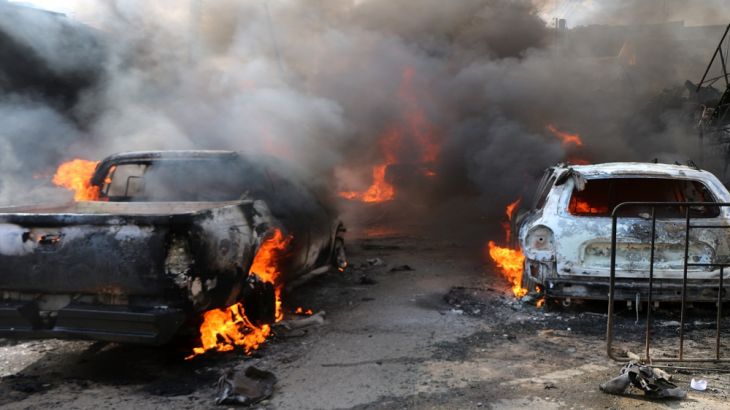Dozens killed in fuel-truck blast in Syrian town of Afrin
Death toll expected to rise after massive explosion in northern Syrian town controlled by Turkish forces.

At least 46 civilians were killed, including 11 children, when an explosive-rigged fuel truck detonated in the northern Syrian town of Afrin, which was seized by Turkish forces more than two years ago.
Another 50 people were wounded in the explosion in a crowded street of Afrin. Turkey’s defence ministry blamed the attack on the Syrian-Kurdish YPG militia.
Photos released by the Syrian Civil Defence rescue workers, also known as the “White Helmets”, showed firefighters battling to douse flames amid gutted buildings and rescue workers carrying charred bodies away from the scene on makeshift stretchers.
A video showed black smoke billowing in the air while ambulance and police sirens wailed in the background.
Tuesday’s blast was one of the deadliest to hit a region under the control of Turkish-backed forces. Ankara frequently blames the YPG for the attacks, while the militia says it does not target civilians.
“The enemy of humanity PKK/YPG has once again targeted innocent civilians in Afrin,” the Turkish ministry said on Twitter.
The United States condemned the attack, which State Department spokeswoman Morgan Ortagus said claimed “the lives of dozens of people shopping in the central market as they prepared to break the Ramadan fast”.
“Initial reports indicate many victims were civilians, including children,” she said in the statement, reiterating a US call for a nationwide ceasefire in Syria. “Such cowardly acts of evil are unacceptable from any side in this conflict.”
|
|
Rami Abdul Rahman, head of the UK-based the Syrian Observatory for Human Rights, a monitor with a network of sources inside Syria, said “at least 46” people had been killed and 50 wounded, some critically, adding the death toll could rise.
At least six pro-Turkish Syrian fighters were among the dead, he added.
‘Terrorist’ group
There was no immediate claim of responsibility, but Turkey blamed the attack on the Kurdish People’s Protection Units (YPG).
Ankara accuses the YPG of being the Syrian offshoot of the outlawed Kurdistan Workers’ Party (PKK), which has waged an armed rebellion against Turkey since 1984. The PKK is considered a “terrorist group” by Ankara and many Western nations.
The Kurdish-led Syrian Democratic Forces Council on Wednesday accused Turkey of allowing “terrorist organisations” to regroup and launch such attacks, a reference to the armed group ISIL (ISIS).
Syrian Kurds have played a major role in fighting ISIL in Syria.
“We in the council condemn and denounce this cowardly terrorist act that targeted innocent civilians and threatens the remaining sons of Afrin to move and leave their villages and cities,” the council said.
Donate blood
Syrian activists said the blast on Tuesday burned several people to death, including some who were stuck inside their vehicles.
|
|
In a hospital yard, 10 charred bodies were covered with blankets next to ambulances. In an ambulance nearby, two charred bodies were inside, according to videos and photos circulated by activists.
The blast set several cars and shops on fire and tanker trucks were used to fight the blaze.
Amid fears the death toll could rise, activists in northern Syria urged people in the Afrin area to head to hospitals and donate blood.
Similar explosions in areas controlled by Turkey-backed opposition fighters have killed many people in recent months, attacks that Ankara blames on Kurdish fighters.
Turkey’s military and its Syrian rebel allies seized Afrin, a mainly Kurdish district, from the YPG in March 2018 in a major offensive.
Ankara supports the Syrian opposition in the war against President Bashar al-Assad, but has worked closely with his ally, Russia, to secure and monitor local ceasefires.
The Syrian conflict has killed hundreds of thousands of people since 2011 and forced more than half of the country’s pre-war population from their homes.